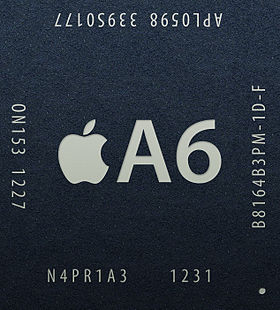Application
processors
(32-bit) | | ARMv7-A | | Cortex-A5 |
|
|---|
| Cortex-A7 |
- Allwinner A2x, A3x, A83T, H3, H8
- NXP i.MX7, QorIQ LS10xx, NXP i.MX6UL
- Broadcom VideoCore BCM2836, BCM23550
- Leadcore LC1813, LC1860/C, LC1913, LC1960
- Marvell Armada PXA1920, 1500 mini plus
- MediaTek MT65xx
- Qualcomm Snapdragon 200, 205, 208, 210, 212, 400
|
|---|
| Cortex-A8 |
|
|---|
| Cortex-A9 |
- Actions ATM702x, ATM703x
- Altera Cyclone V, Arria V/10
- Amlogic AML8726, MX, M6x, M801, M802/S802, S812, T86x
- Apple A5, A5X
- Broadcom VideoCore BCM21xxx, BCM28xxx
- Freescale i.MX6
- HiSilicon K3V2, 910's
- InfoTM iMAPx912
- Leadcore LC1810, LC1811
- Marvell Armada 1500 mini
- MediaTek MT65xx
- Nvidia Tegra, 2, 3, 4i
- Nufront NuSmart 2816M, NS115, NS115M
- Renesas EMMA EV2, R-Car H1, RZ/A
- Rockchip RK292x, RK30xx, RK31xx
- Samsung Exynos 4 421x, 441x
- ST-Ericsson NovaThor
- Telechips TCC8803
- Texas Instruments OMAP 4
- Texas Instruments Sitara AM4xxx
- VIA WonderMedia WM88x0, 89x0
- Xilinx Zynq-7000
- ZiiLABS ZMS-20, ZMS-40
|
|---|
| Cortex-A15 |
|
|---|
| Cortex-A17 |
|
|---|
| Others |
|
|---|
ARMv7-A
compatible |
- Apple A6, A6X, S1, S1P, S2, S3
- Broadcom Brahma-B15
- Marvell P4J
- Qualcomm Snapdragon S1, S2, S3, S4 Plus, S4 Pro, 600, 800 (Scorpion, Krait)
|
|---|
|
|---|
| ARMv8-A | |
|---|
|
|---|
Application
processors
(64-bit) | | ARMv8-A | | Cortex-A35 |
|
|---|
| Cortex-A53 |
- Actions GT7, S900, V700
- Allwinner A64, H5, H64, R18
- Altera Stratix 10
- Amlogic S9 Family, T96x
- Broadcom BCM2837
- EZchip TILE-Mx100
- HiSilicon Kirin 620, 650, 655, 658, 659, 930, 935
- Marvell Armada PXA1928, Mobile PXA1908/PXA1936
- MediaTek MT673x, MT675x, MT6761V, MT6762/V, MT6763T, MT6765/G/H, MT6795, MT8161, MT8163, MT8165, MT8732, MT8735, MT8752
- NXP ARM S32, QorIQ LS1088, LS1043, i.MX8M
- Qualcomm Snapdragon 215, 410, 412, 415, 425, 427, 429, 430, 435, 439, 450, 610, 615, 616, 617, 625, 626, 630
- Renesas RZ/V2M
- Rockchip RK3328, RK3368
- Samsung Exynos 7570, 7578, 7580, 7870, 7880
- Texas Instruments Sitara AM6xxx
- UNISOC SC9820E, SC9832E, SC9860/GV
- Xilinx ZynqMP
|
|---|
| Cortex-A57 |
|
|---|
| Cortex-A72 |
- AWS Graviton
- Broadcom BCM2711
- HiSilicon Kirin 950, 955, Kunpeng 916
- MediaTek MT6797/D/T/X, MT8173, MT8176, MT8693
- MStar 6A938
- Qualcomm Snapdragon 650, 652, 653
- Rockchip RK3399
- NXP QorIQ LS2088, QorIQ LS1046A, QorIQ LX2160A, QorIQ LS1028A, i.MX8
|
|---|
| Cortex-A73 |
- Qualcomm Snapdragon 460, 632, 636, 660, 662, 665, 680, 685, 6s 4G Gen 1, 835
- Samsung Exynos 7872, 7884, 7885, 7904, 9609, 9610, 9611
- HiSilicon Kirin 710, 960, 970
- MediaTek MT6771/V, MT6799, MT8183, MT8788
- Amlogic S922X
|
|---|
| Others |
|
|---|
ARMv8-A
compatible |
|
|---|
|
|---|
| ARMv8.1-A | |
|---|
| ARMv8.2-A | | Cortex-A55 |
|
|---|
| Cortex-A75 |
- Qualcomm Snapdragon 670, 710, 712, 845, 850
- Samsung Exynos 9820, 9825
- MediaTek MT6769H/T/V/Z, MT6768, MT6779V
- UNISOC T310, T606, T610, T615, T616, T618, T619, T620, T700, T710, T7200, T7225, T7250, T7255, T7280, T740
|
|---|
| Cortex-A76 |
- Allwinner A733
- Google Tensor
- HiSilicon Kirin 810, 820, 980, 985, 990
- Qualcomm Snapdragon 480(+), 675, 678, 720G, 730(G), 732G, 765(G), 768G, 855(+), 860, 7c (Gen 2), 8c, 8cx (Gen 2)
- Microsoft SQ1 and SQ2
- MediaTek MT6781, MT6785V, MT6789, MT6833V/P, MT6853V/T, MT6873, MT6875, Dimensity 6020, 6080, 6100+, 6300(+), MT8192
- Samsung Exynos 990
- UNISOC T750, T760, T765, T770, T820, T8100, T8200, T9100
|
|---|
| Cortex-A77 |
|
|---|
| Cortex-A78 |
- Google Tensor G2
- MediaTek MT6877, MT6878, MT6879, MT6891, MT6893, Dimensity 7020, 7025 (Ultra), 7030, 7050, 7300(Energy/X), 8000, 8020, 8050, 8100, 8200, Kompanio 900T, 1200, 1380, 1300T
- Qualcomm Snapdragon 4 Gen 1, 4(s) Gen 2, 695, 6 Gen 1, 6(s) Gen 3, 778G(+), 780G, 782G, 888(+)
- Samsung Exynos 1080, 1280, 1330, 1380, 2100
|
|---|
| Cortex-X1 |
|
|---|
| Neoverse N1 |
|
|---|
| Others |
- Cortex-A65, Cortex-A65AE, Cortex-A76AE, Cortex-A78C, Cortex-X1C, Neoverse E1
|
|---|
ARMv8.2-A
compatible |
|
|---|
|
|---|
| ARMv8.3-A | |
|---|
| ARMv8.4-A | |
|---|
| ARMv8.5-A | |
|---|
| ARMv8.6-A | |
|---|
| ARMv8.7-A | |
|---|
| ARMv9.0-A | |
|---|
| ARMv9.2-A | |
|---|
|
|---|
 The A6 processor
The A6 processor